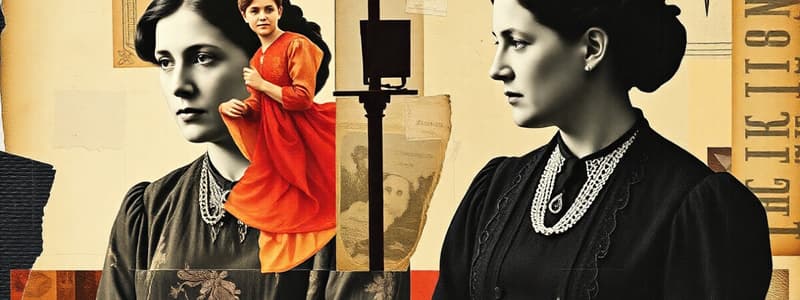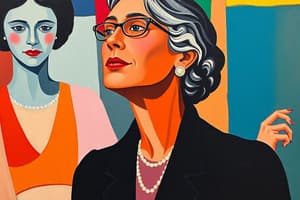Podcast
Questions and Answers
Which of the following statements best characterizes the relationship between Frances Willard's views on religion and her stance on women's suffrage?
Which of the following statements best characterizes the relationship between Frances Willard's views on religion and her stance on women's suffrage?
- Willard saw suffrage as a means to achieve greater religious freedom for women, believing that voting would empower them to challenge traditional religious doctrines.
- Willard believed that religious faith was a necessary foundation for women's suffrage, as it instilled the virtues required for responsible citizenship.
- Willard saw a strong connection between religious beliefs and her advocacy for women's rights, arguing that faith in God and faith in women were intertwined. (correct)
- Willard's religious beliefs were largely separate from her political activism, as she viewed suffrage as a practical issue rather than a moral one.
What was Frances Willard's goal in advocating for the right of women to ride bicycles?
What was Frances Willard's goal in advocating for the right of women to ride bicycles?
- Willard aimed to reshape women's fashion by promoting more comfortable and functional clothing suitable for cycling.
- Willard saw bicycling as a practical means for women to travel independently and participate in public life.
- Willard believed that bicycling would promote women's physical health and enhance their overall well-being.
- Willard sought to challenge societal norms that restricted women's mobility and freedom of movement. (correct)
What was Ida B. Wells-Barnett's main objection to Frances Willard's statements about Black people?
What was Ida B. Wells-Barnett's main objection to Frances Willard's statements about Black people?
- Wells-Barnett feared that Willard's statements would incite violence against Black people and jeopardize the safety of Black communities in the South.
- Wells-Barnett felt that Willard's statements discredited the entire suffrage movement and damaged its reputation as a progressive force for change.
- Wells-Barnett believed that Willard's statements contradicted her own views on racial equality and undermined the WCTU's commitment to social justice.
- Wells-Barnett argued that Willard's statements were not only racist but also strategically unsound, as they alienated a substantial part of the suffrage movement's potential allies. (correct)
What was Frances Willard's unusual request regarding her burial?
What was Frances Willard's unusual request regarding her burial?
Which of the following statements accurately reflects the author's overall assessment of Frances Willard?
Which of the following statements accurately reflects the author's overall assessment of Frances Willard?
How did Frances Willard's understanding of the relationship between suffrage and alcohol consumption differ from that of other suffragists?
How did Frances Willard's understanding of the relationship between suffrage and alcohol consumption differ from that of other suffragists?
Which statement best captures Frances Willard's approach to the suffrage movement as articulated in the text?
Which statement best captures Frances Willard's approach to the suffrage movement as articulated in the text?
Based on the provided information, what challenges did Frances Willard face in her efforts to promote women's suffrage?
Based on the provided information, what challenges did Frances Willard face in her efforts to promote women's suffrage?
Which of the following aspects of Frances Willard's personality and leadership style is NOT highlighted in the text?
Which of the following aspects of Frances Willard's personality and leadership style is NOT highlighted in the text?
In what way did Frances Willard's approach to the suffrage movement challenge the traditional view of women's roles in society?
In what way did Frances Willard's approach to the suffrage movement challenge the traditional view of women's roles in society?
Which of the following statements best describes the role of religion in the suffrage movement as depicted in the text?
Which of the following statements best describes the role of religion in the suffrage movement as depicted in the text?
Based on the provided content, what was the main reason for Susan B. Anthony's enthusiastic response to Frances Willard joining the suffrage cause?
Based on the provided content, what was the main reason for Susan B. Anthony's enthusiastic response to Frances Willard joining the suffrage cause?
What does the text suggest about Frances Willard's leadership style?
What does the text suggest about Frances Willard's leadership style?
What significant event did Frances Willard associate with her sixteenth birthday?
What significant event did Frances Willard associate with her sixteenth birthday?
Which of the following best reflects Frances Willard's perspective on education for girls?
Which of the following best reflects Frances Willard's perspective on education for girls?
What childhood experience contributed to Frances Willard's views on women's rights?
What childhood experience contributed to Frances Willard's views on women's rights?
How did Frances Willard feel about the societal expectations placed on women?
How did Frances Willard feel about the societal expectations placed on women?
What role did Frances Willard's father play in her upbringing?
What role did Frances Willard's father play in her upbringing?
What metaphor did Frances Willard use to express her views on advocacy?
What metaphor did Frances Willard use to express her views on advocacy?
Which group of people did Frances Willard suggest were deemed unworthy of the vote?
Which group of people did Frances Willard suggest were deemed unworthy of the vote?
What impact did Frances Willard's early childhood games have on her identity?
What impact did Frances Willard's early childhood games have on her identity?
Flashcards
Who was Frances Willard?
Who was Frances Willard?
Frances Willard was a prominent women's rights advocate and social reformer known for her work with the Woman's Christian Temperance Union (WCTU).
What was Frances Willard's stance on education?
What was Frances Willard's stance on education?
Frances Willard believed in the power of education for both boys and girls, emphasizing equal learning opportunities. She challenged traditional societal expectations that limited women's roles.
How was Frances Willard impacted by societal expectations?
How was Frances Willard impacted by societal expectations?
Frances Willard faced societal pressures to conform to traditional feminine roles. She was expected to adopt a more 'refined' appearance, which she found restrictive and limiting.
How did Frances Willard's childhood shape her views on gender roles?
How did Frances Willard's childhood shape her views on gender roles?
Signup and view all the flashcards
What is the significance of the famous painting featuring Frances Willard?
What is the significance of the famous painting featuring Frances Willard?
Signup and view all the flashcards
What does Frances Willard's famous quote symbolize?
What does Frances Willard's famous quote symbolize?
Signup and view all the flashcards
What was unique about Frances Willard as a historical figure?
What was unique about Frances Willard as a historical figure?
Signup and view all the flashcards
Frances Willard's belief in women's faith
Frances Willard's belief in women's faith
Signup and view all the flashcards
Frances Willard's views on race
Frances Willard's views on race
Signup and view all the flashcards
Ida B. Wells-Barnett's response to Frances Willard
Ida B. Wells-Barnett's response to Frances Willard
Signup and view all the flashcards
Frances Willard's multifaceted advocacy
Frances Willard's multifaceted advocacy
Signup and view all the flashcards
Frances Willard's advocacy for bicycling
Frances Willard's advocacy for bicycling
Signup and view all the flashcards
Frances Willard and the Temperance Movement
Frances Willard and the Temperance Movement
Signup and view all the flashcards
Frances Willard's view on suffrage
Frances Willard's view on suffrage
Signup and view all the flashcards
Religious Unity in the Suffrage Movement
Religious Unity in the Suffrage Movement
Signup and view all the flashcards
WCTU and the Suffrage Movement
WCTU and the Suffrage Movement
Signup and view all the flashcards
Frances Willard's Leadership Style
Frances Willard's Leadership Style
Signup and view all the flashcards
Frances Willard's Strategic View of Suffrage
Frances Willard's Strategic View of Suffrage
Signup and view all the flashcards
Unity in the Suffrage Movement
Unity in the Suffrage Movement
Signup and view all the flashcards
Frances Willard's views on women's role in politics
Frances Willard's views on women's role in politics
Signup and view all the flashcards
Study Notes
Frances Willard: A Life Dedicated to Reform
- Frances Willard, born September 28, 1839, and died February 17, 1898, was a prominent American activist and educator.
- Willard experienced a challenging childhood on a Wisconsin farm, where she developed resilience and independence.
- Her brother, Oliver, challenged her to walk across a field while holding a loaded gun. She boldly complied, demonstrating her fearless nature.
- Willard faced societal norms and expectations around gender roles and women's rights; at age 16, she changed from a tomboy to what was considered a woman's outfit.
- Willard's education was extensive; she graduated from a women's college in Evanston, Illinois, in 1859.
- Willard became a teacher, challenging conventional gender roles in education.
- She became active in the temperance movement, advocating for the prohibition of alcohol.
- Willard helped found the Woman's Christian Temperance Union (WCTU) in 1874.
- Later, she became its president, leading it to become a powerful force in social reform.
- She argued that suffrage was vital to improving women's lives and the lives of families.
Willard's Suffrage Activism
- Willard supported the women's suffrage movement (the right to vote) and strongly believed that giving women suffrage was to improve women's and families' lives.
- Willard was a dedicated advocate for women's rights and social reform.
- She embraced a broad view of women's roles, including their role in politics.
- Willard argued that voting rights were crucial for women to protect their home and families. Willard viewed the right to vote as a tool for women to advocate for their needs and interests and protect their homes and families.
- Willard believed that women had a critical role in society beyond the domestic sphere and actively worked to improve the lives of women.
- Willard's approach to suffrage differed from others; she framed suffrage as a means to improve homes and protect families and children from harm.
- Her approach did not always align with others in the movement, leading to disagreements.
- She overcame opposition and challenges in furthering the suffrage cause.
Studying That Suits You
Use AI to generate personalized quizzes and flashcards to suit your learning preferences.




